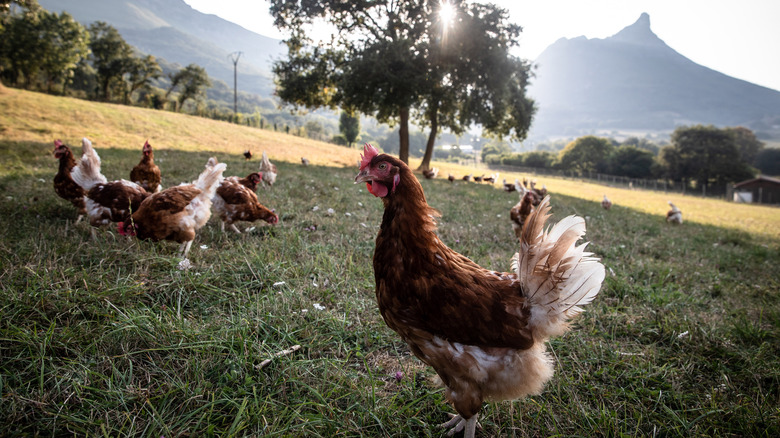Why Some People Prefer Farm Fresh Eggs Over Store Bought
If you've ever brought home a dozen eggs from the farmer's market and cracked one open, you were likely surprised by the rich, day-glow orange color of the yolk in comparison to the pale yellow yolk of a store-bought egg. Wanting more color on your over easy isn't the only reason that folks are turning to the farm over the aisle when shopping for eggs.
Called the incredible edible for a reason, eggs are packed with vitamins, antioxidants, protein, and omega-3 fatty acids that might significantly benefit our health. According to Healthline, a single egg contains "almost every nutrient" we need and could be considered a superfood. Although "eggs are high in cholesterol," they can raise your HDL, or "good" cholesterol, which ironically might decrease the chance of stroke and heart disease in some people. The amount of nutrients in an egg dramatically depends on the diet and environment of the hens producing them.
SFGate explains that supermarket eggs usually come from caged chickens fed a vegetarian diet. Because this is not their natural diet, this results in a less nutritious egg. Even though some caged hens have diets supplemented with flaxseeds, the eggs of free-range hens that are allowed to forage for their food have much higher amounts of omega-3 fatty acids, as well as more vitamins and nutrients and darker yolks, per Eat This, Not That!.
Are farm-fresh eggs better than store bought?
Farm chickens are living their best lives and producing better eggs because of it. According to Hobby Farms, free-range hens can forage for their own food, dust bathe to keep their plumage healthy, and roost at night. Store-bought eggs usually come from chickens that live in small cages where they can hardly move and are sometimes subjected to inhumane treatments like starvation and beak-cutting practices. The Humane Society explains that only free-range, pasture-raised, and certified organic eggs come from hens that are allowed outside and safe from mistreatment.
Another benefit of eggs from cage-free chickens is that they are less likely to be contaminated with Salmonella. Eat Drink Better says that salmonella infections are more likely to occur in chickens that are subjected to inhumane and unsanitary living conditions of industrial egg farms. Free-range chickens are less likely to be infected by a salmonella outbreak because they aren't packed into cages with other infected hens where the bacteria can spread more easily. Today's consumer is increasingly more concerned with where their food comes from, and they prefer buying eggs laid by happier, healthier chickens.
Farm fresh eggs last longer and taste better
Any free-range aficionado will tell you that a farm-fresh egg cooks up better and is far superior in flavor, color, and shelf-life than any store-bought option. Fresh being the operative word, a pasture-raised chicken produces eggs that will last up to three months in the refrigerator, per Rural Living Today. Store-bought eggs that the USDA recommends consuming within "three to five weeks" from when they were first refrigerated could only leave you with a week or two of optimal freshness depending on how long it took for the store to get the eggs on the shelf.
The healthy diets that lead to those dark yellow yolks can also impart a richer color to your morning scramble. As far as taste is concerned, a series of Serious Eats tests had mixed results: Some testers thought they tasted the same, and they were more likely to pick the farm-fresh egg over the store-bought egg when they knew where the eggs came from. However, farm-fresh egg whites are preferred by bakers because their whites provide an uncompromised protein structure that usually whips up and rises better than store-bought eggs, per What Happens On The Homestead.
For people who want a humanely produced, safer, and all-around superior egg, it seems that once you go farm fresh, you never go back.


